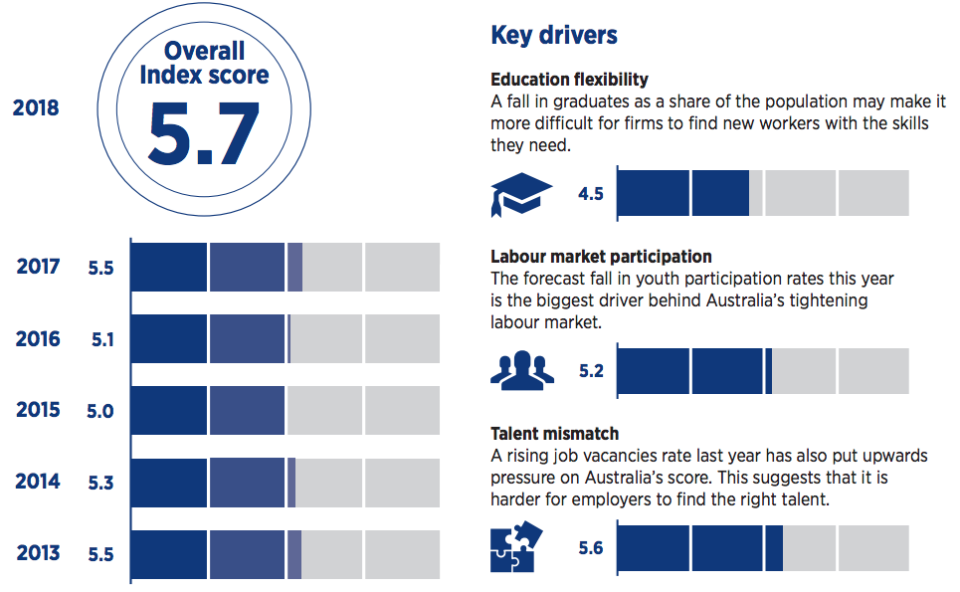Don't let a robot replace you: 6 ways to upskill to stay relevant

The gap between skilled job positions and jobseekers with appropriate matching skills has widened for the fifth year in a row, leaving employers struggling to find the right candidate.
As automation and robotics look set to replace millions of jobs, workers are at risk of losing out to machines unless they upskill to stay relevant
Also read: The workplace benefit Aussies want most from their job
“For example, staffing demand in high-skill industries such as engineering, technology, life sciences, banking, finance and professional services outpaces demand in low-skill industries such as agriculture or manufacturing,” explained Hays Australia and New Zealand managing director Nick Deligiannis.
Technology has also played a major part in the growing number of job openings in high-skill sectors.

“As it takes time to undertake the training necessary to work in those industries, it potentially makes them more vulnerable to skill shortages as the number of people qualified to start work cannot be changed quickly.
“Anyone who works in a job that sees them perform routine, repetitive tasks could see part of their job automated and should look at upskilling,” Deligiannis said.
Also read: The top 10 jobs of the future
One in six Australian jobs are at risk of being automated by the year 2030, according to recent research and workers in lower-skilled or manual labour roles deemed to be at the greatest risk of losing out to the machines.
How do I upskill?
“The particular skills in demand vary from industry to industry, so it’s important to keep up with the technical know-how relevant to your specific job.”
Luckily, there are a few options already available to you if you’re looking to brush up on your skills.
1. Ask for opportunities that will stretch you.
“Taking on a project outside your usual remit is a great way to develop new competencies. If working on a project with people from other teams, you’ll also hone important collaboration and problem-solving skills,” Deligiannis told Yahoo Finance.
But do your due diligence, identify an area where the business could benefit with your attention, and then have a talk with your manager. You’ve got to think about how you juggle your current workload, too.
2. Stay plugged in.
“Follow industry leaders and thinkers via LinkedIn, TED Talks, YouTube feeds, Twitter
and other social media.
“Don’t forget to ask mentors and the colleagues you admire for recommendations.”
Also read: The five factors shaping the workforce of the future
3. Join an association.
This can offer you with a community and a network that can lead to career-building and new skills. But before you join, ask about their learning programs, networking events and mentorship programs, Deligiannis advises.
And if you’re just starting out, they might do reduced fees for new entrants into the industry.
4. Seek out educational resources.
With the internet, you can learn just about everything and anything through online tutorials and videos – so start there first! Plus there may be short courses out there, such as specialist certificates, that could help you keep up with new developments in your industry.
The recruitment agency’s managing director recommends ‘Moocs’, or Mass Open Online Courses, which offers free courses from globally reputed institutions and even some top tech companies.
5. Start where you are.
There could be courses right under your nose.
“Check out free self-learning modules offered by your employer. These courses generally reflect the skills an organisation wants its workforce to develop so acquiring skills and knowledge this way is not only free but also could raise your standing at work.”
Also read: The 10 factors that got women CEOs to the top
Another hot trend is also peer-to-peer learning, Deligiannis observes: ask a colleague to teach you a new skill, or set up a group with some colleagues. And if you garner enough interest, you could suggest to your manager to invite a senior leader or an external industry expert for a lunchtime seminar.
6. Don’t neglect your soft skills.
No matter how intelligent robots become, soft skills can’t be automated.
“Employers are looking to see evidence that candidates are developing the soft skills needed to solve new problems and collaborate with peers to exchange knowledge and ideas,” Deligiannis told Yahoo Finance.
“For example, as technology drives more of our work tasks, employers are looking to their people to make gains through the way they engage and build relationships both internally and externally as well as how they collaborate and communicate to solve constantly evolving challenges and problems.
“Adaptability, innovation, critical thinking and emotional intelligence are other important soft skills that employers value.”

 Yahoo Finance
Yahoo Finance 

